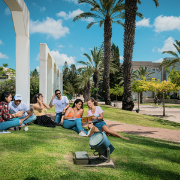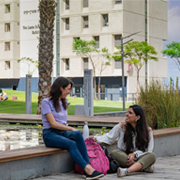Safety, Health, and Security
During your time with us, our focus is on taking care of you, getting you the support you need and keeping you safe and healthy. We provide safety and wellbeing protocol in our pre-departure information kit, security training as part of orientation and have a robust emergency management plan in place.
While in Israel, you will be given the telephone numbers of relevant personnel and campus offices (such as the Lowy International School Office staff), detailed instructions on medical care and emergencies, and the mobile number of the emergency hotline available 24/7 including holidays. You are encouraged to read all information received very carefully and keep it easily accessible during your stay.
The Lowy International School employs multiple Community Leaders who provide guidance and answer any questions you might have regarding your stay in Tel Aviv. They are also in charge of organizing extracurricular and cultural activities.
During arrival, international students are introduced to Community Leaders and given detailed instructions on how to contact them.
 The Lowy International School Emergency Contact Information
The Lowy International School Emergency Contact Information
If you need to contact a Lowy International School staff member in Tel Aviv in case of an emergency, you can contact us at the emergency phone numbers listed below.
Please use office phone numbers during work hours (Sunday to Thursday, 9AM–3PM).
In Case of Emergency in Israel During Office Hours
The Lowy International School Office: The Green House, 24 Dr. George Wise St.
Open each day Sunday through Thursday*, 9:00am-3:00pm
Office Number: +972-(0)3-640-8118 (Ask for the Community Leader)
*You (students) will be notified of office closure for holidays in advance. During closure, you should use the 24/7 Emergency Hotline (information below) in case of emergency.
In Case of Emergency in Israel Outside Office Hours
24/7 Emergency Hotline: + 972-(52)-5346188
This number is intended exclusively for emergency situations (safety, mental health, or physical emergencies) of currently enrolled students on campus. Calls regarding other service departments will not be answered.
 Emergency Telephone Numbers in Tel Aviv
Emergency Telephone Numbers in Tel Aviv
|
Police |
100 |
|
Medical First Responders / Ambulance |
101 |
|
Fire Department |
102 |
|
Electric Company |
103 |
|
City Municipality (Tel Aviv) |
106 |
|
Association of Rape Crisis Center |
Women: 1202 |
|
Ichilov Hospital / Sourasky Medical Center |
03-697-4444 |
|
“Bikur Rofeh” Emergency Medical Center at Yigal Alon St. 90 |
03-6272350 |
 Additional Safety, Health, and Wellness Guidelines
Additional Safety, Health, and Wellness Guidelines
The TAU International Safety, Security, Health, and Wellness Guidelines offer comprehensive information on safety, security, health, and wellness at TAU International. These contain detailed information about:
- Mandatory Health Insurance Guidelines for Study Abroad and Short Term Program Students
- Security Guidelines
- Safety Concerns
- Important Contact Information
- Mobile Phone Policy - Staying in Touch in Case of Emergency
- Psychological and Wellness Services
- Mandatory Health Insurance and How to Use it
- TAU International Travel Guidelines
- Sexual Assault and Harassment
- Discrimination
- Fire Safety
- Environmental Safety Concerns
- Drugs and Alcohol Policies
- Student Code of Conduct
Fire Safety
All TAU facilities, including dormitories, are regularly inspected for Fire Safety and Compliance in accordance with Israeli law. Students should make note of the location of the fire extinguishers in the dormitories or in the place of residence (for those living off-campus) and make note of how to use them in case of fire emergency. Students are also encouraged to make note of all sprinklers and fire evacuation routes. In case of fire, elevators should never be used. Students should not take any personal belongings with them if evacuation is necessary; students should evacuate the building calmly and once outside proceed to a safe area while taking care not to cross any streets without thoroughly checking to be sure it is safe to cross.
Electrical Safety in the Dormitories
Should students notice wires are exposed, outlets or switches are broken or damaged, appliances are broken etc. they need to notify the dorms maintenance immediately upon the discovery of a safety hazard. It is stated emphatically that the resident may not make any changes and/or additions to the electrical systems, on his own or through a licensed technician.
Danger of Falling
It is absolutely forbidden to go on the rooftops of any of the buildings including the dormitories for any reason, to climb or sit on the window sills or in high places that do not have railings. Windows, screens or any part of them may not be dismantled. Planters, flower pots or any other item may not be placed on the outside sills of the windows or on the outer building walls.
Earthquakes
To best prepare for the event of an earthquake, please consult an important resource which is the Israeli Home Front Command website. This is a national website that monitors public safety in Israel and it contains the safety guidelines to follow in case of an earthquake event. As earthquakes can come without prior warning, a high level of awareness and familiarity with these guidelines can save lives. Following is the link to the Home Front Command's instructions on the subject, with details of the earthquake safety procedures.
Swimming/Water Safety
One of the greatest things about Tel Aviv are the incredible city beaches and the beautiful Mediterranean Sea spanning the entire coastline of Israel. While enjoying this natural wonder, it’s important to review the Tel Aviv Municipality guidelines for beach safety:
- Swimming at the Tel Aviv beaches is prohibited when there is no lifeguard on duty. Outside of Tel Aviv, we strongly recommend that students never enter the water if not in an area where there is a designated lifeguard on duty.
- Bathers must comply with the lifeguard and rescue guards at all times.
- Swimming/entering the sea is prohibited when the black flag(s) is raised. Even if the sea looks calm, a black flag indicates dangerous currents. Do not enter the sea in thiscase.
- Building a fire is always prohibited on beaches.
- Rescue services at the Tel Aviv beaches are available during set hours during the summer season which are typically 07:15am–4:45pm (consult website to verify). Do not swim outside of these hours.
- Never, ever swim while intoxicated.
Heat/Dehydration
Israel's strong, Mediterranean sun, coupled with hot, dry weather in many parts of the country, for the majority of the year, pose health risks that include dehydration and heat stroke, as well as long-term damage and risk of skin cancer from exposure to the sun. Other consequences of sun damage can include severe burns.
Some tips to stay cool and safe from the heat:
- Avoid prolonged exposure to the sun between the hours of 10:00 a.m. and 4:00 p.m.
- Use a sunscreen of at least 30 SPF applied 1/2 hour before going outside. Reapply sunscreen every few hours, or after exercising, swimming, or playing.
- Avoid clothing that exposes sensitive skin to the sun. Wear light, loose garments with sleeves, in natural fabrics such as cotton. White and other light colors deflect the sun, while dark colors absorb heat.
- Wear a hat with a brim to keep the sun off student’s face. Covering of the head helps to prevent heat stroke as well.
- Wear sunglasses which protect from harmful ultra-violet rays.
- Don't forget to drink plenty of water frequently. During the summer months, you can dehydrate even before you feel thirsty. Remember that alcohol and caffeinated drinks can dehydrate you further.
- Remember that risks are present even in cooler winter weather. Take precautions such as the above year-round.
Drugs and Alcohol
- The legal drinking age in Israel is 18.
- Should students choose to drink alcohol, they are advised to drink in moderation.
- Like all big cities, nightlife in Tel Aviv is not without its risks. While nightlife in Tel Aviv is lively and fun, it is essential that you maintain awareness of surroundings and it is advised that you stick together and watch out for one another.
- You are advised to watch your drinks at all times. Never accept a drink from a stranger or drink from something that has been left unattended.
- It should be noted that the majority of Israelis do not drink heavily. Thus, from a cultural standpoint, heavy drinking and public drunkenness will stand out in Israel and therefore is not advised.
- Drugs, including marijuana, are illegal in Israel, period.
- Drug use can result in arrest, fines, deportation, and more. TAU (and student’s home country Embassy) is unable to intervene on student’s behalf in any matter of the law including suspected drug use.
Should you need assistance in managing drug and alcohol use, there are resources available. Please read further TAU’s information on preventing drug and alcohol abuse.
Sexual Assault or Harassment
While Tel Aviv has a vibrant and exciting scene that is for the most part very safe, students are encouraged to adhere to the “buddy system” while out in Tel Aviv, remaining with at least one friend at all times. We encourage students not to engage in any displays of public intoxication, as unfortunately, this is often the state in which unwanted advances may be made.
Students should ALWAYS keep a close eye on their drinks, never leaving a drink unattended and making sure to watch carefully how a drink is made. If students have any reason to suspect their drink has been compromised, do not test it out – just get a new one. Do not accept any gum or candy from strangers.
Students are encouraged to use Gett or an authorized taxi service; do not get in an unmarked or unrecognizable taxi at any time.
Again, Tel Aviv is quite safe as far as large cities go. That said, we don’t recommend students walk alone late at night, especially in remote areas, areas that are not well-lit, or in areas which students aren’t familiar with.
Should a student experience sexual assault or harassment, there are several resources available:
- Contact the Emergency Hotline 24/7; the team can help walk you through the resources available and discuss various steps you can take depending on your circumstances and wishes
- You can contact the Police by calling 100
- For any sexual harassment or assault, you can contact the Association of Rape Crisis Centers (English speaking) – Women call 1202; Men call 1203
- Should you need medical assistance as a result of harassment or assault, please contact the Emergency Hotline for assistance in making an appointment. If you don’t feel comfortable doing that, please consult the information in the Welcome Kit on making a doctor’s appointment or seeking urgent healthcare in Israel
Suspicious Objects and/or People
The majority of Israelis are very used to having a heightened sense of awareness regarding their surroundings. It stems more from common sense as opposed to paranoia – it’s just a good idea in general to know what’s happening around you, wherever you may find yourself.
Students are encouraged to keep an eye on their surroundings at all times and be aware of people, objects, etc. in their vicinity. Report any suspicious or abandoned objects or suspicious people immediately to the nearest security personnel. On-campus security department is available at 03-640-5555.
It is important to not leave any of your baggage unattended, for any amount of time, especially in crowded places to avoid it being considered an abandoned object.
Safety During Excursions and Activities Organized by The Lowy International School
In the planning and execution of all excursions and activities, the Lowy International School strictly obeys the security policies established by Israel's Ministry of Education, the Israeli National Security Center (Moked Teva) and TAU'S Security Department. Transportation to all programmed activities, such as seminars, excursions, visits, and conferences, is handled by University chartered buses and only TAU International authorized passengers are permitted.
All Lowy International School's excursions are cleared far in advance by the Israeli National Security Center ("Moked Teva") and the Ministry of Education. This clearance is coordinated with all appropriate authorities (including Israeli police and army). The Moked Teva is then updated with the groups' whereabouts and plans daily leading up to and during the excursions; should an adjustment to the itinerary need to be made at the last minute for security reasons, the community leaders always have a back-up activity or visit. In rare cases, an excursion or activity will be canceled. In accordance with the recommendation of the Moked Teva, armed guards and trained first-aid personnel carrying first-aid kits escort the students throughout each excursion.
We do not travel into the West Bank over the green line, except in very specific areas determined safe by Israel's security services (for example, parts of the Old City of Jerusalem).
Independent Student Travel
TAU international students often enjoy traveling throughout Israel during their time at TAU, and in addition, many take advantage of the proximity to Europe and other nearby destinations. Students are not excused from class for purposes of traveling, but each semester there are designated holiday breaks in which students can travel independently as well as, of course, weekends.
When traveling outside of Israel, please ensure that proper health insurance coverage is secured before traveling. Kindly note that Israeli health insurance covers you only within Israel, it does not include coverage anywhere abroad or in the West Bank / Palestinian territories.
The Lowy International School does not encourage travel to any area that may be unsafe or pose security risks (such as Jordan, Lebanon, Syria, Gaza, the West Bank, east Jerusalem, the Sinai Peninsula, etc.) Students are required to obtain the most up-to-date safety and security information as issued by Israeli authorities regarding any destination before making travel plans.
Campus Accessibility and Learning Accommodations
In accordance with the University guidelines, students with learning disabilities or accommodation requests must submit official documentation from their home country/university (translated into English by a notary) to the Lowy International School in advance of arrival describing in detail any specific needs they have.
Students must also bring a copy of this documentation with them on-site and give it to their faculty on the first day of class while introducing themselves so that the faculty know who they are and what sorts of needs they may have. The Lowy International School and TAU faculty cannot guarantee that all accommodations received at the home school can be similarly met at TAU but certainly do their best to make any suitable accommodations possible.
There may be an option of additional tutoring or support outside the classroom as needed. Students should be aware that this additional support cannot be guaranteed and is based on teacher availability in the subject as well as the specific student level. If available, the cost of additional tutoring or support will be the sole responsibility of the student.
Review full information on campus accessibility and psychological support and counselling services at Tel Aviv University.
Discrimination
The Lowy International School strives to create a safe, equal and fair environment for all students and does not discriminate on the basis of race, ethnicity, nationality, citizenship, religion, disability, veteran status, marital status, sex, sexual orientation, or gender identity.
If students wish to report any perceived cases of discrimination that occur within or outside of the university, they should contact the Head of the Lowy International Community Leaders Team at orrabergel@tauex.tau.ac.il.




